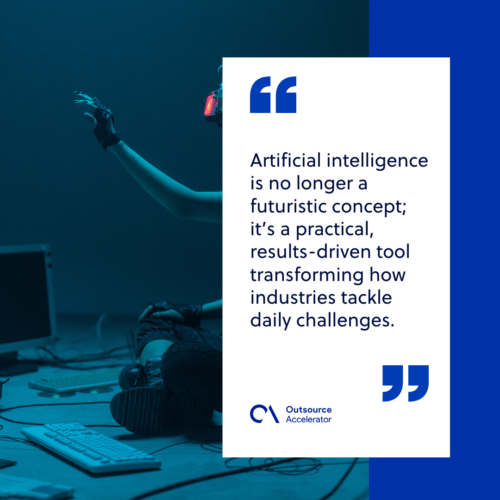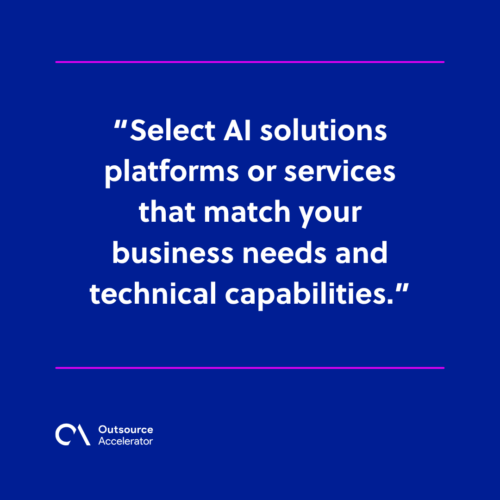Transformative AI solutions for modern industries

Businesses across various sectors face unique challenges, from managing supply chain disruptions to improving customer experiences and optimizing operations.
As industries become increasingly complex, traditional methods often fail to address these demands efficiently. This is where artificial intelligence innovations come into play, offering smarter ways to analyze data, predict trends, and streamline decision-making.
Whether in healthcare, finance, retail, or manufacturing, AI is transforming how companies solve persistent problems.
In this article, we’ll explore how AI solutions are reshaping various industries through practical, impactful applications.
Key AI solutions statistics in 2026
Artificial Intelligence (AI) is not just incrementally improving, but fundamentally reimagining how businesses function.
The statistics below highlight the growing impact and adoption of AI solutions in various industries:
- In late 2022, ChatGPT set records by reaching 1 million users in under a week. By early 2023, its user base had grown rapidly, surpassing 100 million monthly active users.
- Grand View Research forecasts substantial growth in the global AI market, anticipating it will expand to $1.81 trillion by 2030.
- A survey conducted by Omdia found that the AI software market’s global annual revenue exceeds $100 billion
- Data from Hostinger Tutorials indicates that 35% of companies have deployed AI services as a solution to labor scarcity. Additionally, 42% are contemplating AI integration in the foreseeable future.
- PwC estimates that AI technology could boost global revenue by over $15 trillion by the end of the decade, potentially generating $15.7 trillion by 2030 and increasing local economies’ GDP by an additional 26%.
- The latest data from The Insight Partners also shows that global AI chip revenue is set to reach $83.25 billion by 2027, surpassing $80 billion within the next couple of years.
These figures above reveal how companies are using AI to overcome challenges and gain a competitive edge.
Examples of AI solutions for different industries
Artificial intelligence is no longer a futuristic concept; it’s a practical, results-driven tool transforming how industries tackle daily challenges.

Below are some examples of how different sectors are taking full advantage of AI to drive real-world impact:
Healthcare
AI solutions are tailoring modern healthcare by making processes faster, smarter, and more precise.
- Medical imaging. AI analyzes X-rays and CT scans to detect diseases like pneumonia, tuberculosis, and lung cancer. It spots small abnormalities often missed by the human eye, leading to earlier interventions.
- Personalized treatment. AI customizes treatments using genomic data, patient history, and lifestyle insights. This approach boosts treatment effectiveness while reducing side effects.
- EHR analysis. Electronic Health Records (EHRs) contain massive datasets. AI examines these to detect patterns, predict future health issues, and support preventive care.
- Fraud detection. AI flags billing anomalies and identifies suspicious activities, helping prevent fraudulent claims and saving healthcare systems millions.
- Remote patient monitoring. Patients can transmit health data through wearables, which AI analyzes in real time. This enables proactive interventions, particularly for chronic conditions such as diabetes.
- Medical documentation. AI tools automatically convert voice dictation into structured EHR entries. This saves clinicians time and reduces documentation errors.
- Records management. AI organizes patient files, improves access to critical data, and supports compliance with healthcare regulations.
- Decision support. By merging medical records with diagnostic data, AI assists doctors in making evidence-based clinical decisions.
- Enhanced patient care. AI audits prescriptions, suggests personalized medication plans, and prioritizes urgent cases—raising overall care quality.
Retail and e-commerce
Retailers and online stores use artificial intelligence to personalize experiences, improve logistics, and boost customer satisfaction.
- Personalized shopping. AI studies browsing behavior and purchase history to recommend products tailored to each customer.
- Dynamic pricing. Retailers adjust prices based on real-time data such as demand, competitor pricing, and customer trends to remain competitive.
- Inventory forecasting. AI predicts demand with high accuracy, helping maintain stock levels and avoid overstock or shortages.
- Customer service automation. AI chatbots handle queries 24/7, assist with orders, and resolve issues instantly.
- Visual search. Shoppers upload images to find similar products. AI matches these with items in the store’s catalog, improving the user experience.
- Churn prediction. AI solutions can identify customers at risk of leaving based on behavior patterns. Businesses then use targeted promotions to retain them.
- Automated tagging. Image recognition software automatically labels products with details like color or style, streamlining catalog management.
- Customer segmentation. AI groups customers based on shared traits, allowing brands to deliver hyper-targeted campaigns and offers.
- Stock management. AI analyzes shopping trends to help retailers restock efficiently and reduce waste.
- Fraud detection. Real-time analysis detects unusual transaction behavior, safeguarding customer data and reducing losses.
- Upselling and cross-selling. AI solutions can also suggest complementary or premium products during the shopping journey, boosting average order value.
Banking and financial services
Financial institutions rely on AI solutions to reduce risks, detect fraud, and improve customer interactions.
- Fraud detection. AI identifies suspicious activities, such as unusual transaction patterns, and helps banks act before damage occurs.
- Credit scoring. It evaluates alternative data sources—like utility payments or online behavior—to assess creditworthiness more fairly.
- AML compliance. AI processes massive transaction volumes to detect money laundering indicators quickly and accurately.
- Process automation. This innovation automates routine tasks such as document scanning, data extraction, and customer onboarding.
- Regulatory compliance. AI reads, interprets, and updates financial institutions about evolving laws, helping them stay compliant.
- Portfolio management. AI analyzes market data to recommend investment strategies and automate trading decisions.
- Document processing. Contracts, statements, and reports are analyzed and categorized using AI, speeding up processing and minimizing human error.
- Debt management. AI helps lenders identify repayment risks and develop customized repayment plans to recover loans efficiently.
Supply chain and logistics
AI enhances visibility, improves planning, and reduces disruptions across supply chains.
- Warehouse optimization. Artificial intelligence analyzes inventory data to arrange storage for maximum space utilization and efficiency.
- Shipment tracking. Real-time analytics enable the monitoring of deliveries, detection of delays, and rerouting as needed to maintain service levels.
- Inventory automation. AI manages stock levels and triggers orders based on real-time consumption data.
- Resource allocation. AI evaluates workloads to assign tasks efficiently across human and machine resources.
- Bullwhip effect reduction. AI improves demand forecasting, minimizing fluctuations that cause overproduction or shortages.
- Demand forecasting. AI uses historical sales, market trends, and seasonal patterns to make accurate predictions.
- Supply planning. AI helps balance supply and demand by analyzing production, cost, and lead times to calculate optimal stock levels.
Manufacturing
Manufacturers also make use of AI solutions to improve quality, reduce costs, and optimize operations.
- Defect detection. AI-powered cameras and sensors detect product flaws in real time, reducing waste and rework.
- Assembly line automation. AI systems streamline repetitive tasks, increasing production speed and consistency.
- Predictive maintenance. It analyzes sensor data to forecast equipment failure, allowing for scheduled maintenance and avoiding breakdowns.
- Real-time monitoring. AI provides instant feedback from machines, helping address anomalies immediately.
- Quality control. Artificial intelligence compares product images against standards to spot defects quickly and consistently.
- Process optimization. AI studies production workflows to suggest improvements in energy use, cycle times, and resource allocation.
- Order management. It helps manage orders, forecast needs, and allocate inventory across different markets and platforms.
Information technology
AI supports IT teams by automating support, enhancing security, and enabling smarter infrastructure management.
- Helpdesk automation. AI chatbots resolve common IT issues quickly, freeing up support staff for complex problems.
- Cybersecurity. Artificial intelligence constantly monitors network behavior to detect threats and respond to attacks in real time.
- Business intelligence. AI uncovers patterns in data, offering insights and recommendations for better decision-making.
- Software testing. It accelerates testing by automatically generating test cases and simulating user behavior to detect bugs.
- Asset management. AI keeps track of IT assets, predicts maintenance needs, and prevents unnecessary purchases.
- Documentation management. AI organizes technical documents, extracts insights, and helps IT staff find information faster.
- Predictive maintenance. Outages are prevented and uptime is improved across IT systems through AI’s analysis of incident logs and usage patterns.
From diagnosing diseases to optimizing global logistics, AI solutions are already driving measurable value across every major sector. As businesses continue adopting these technologies, the possibilities for innovation and efficiency will only expand.
How to implement AI solutions in your business
Successful implementation of AI solutions requires a clear strategy, the right tools, and team alignment.
Consider the following to get started:
Identify business challenges
Start by pinpointing specific problems AI can solve. Whether it’s reducing manual work, improving customer experience, or optimizing inventory, focusing on clear objectives helps guide the right solution.
Assess data readiness
AI relies on quality data. Evaluate the availability, accuracy, and organization of your business data. Clean, structured data increases the effectiveness of AI models and reduces implementation time.
Choose the right AI tools
Select AI solutions platforms or services that match your business needs and technical capabilities. Cloud-based AI tools like Google Cloud AI, Azure AI, or OpenAI’s API provide scalable and flexible options.

Build or upskill your team
Equip your team with the skills needed to manage AI tools. Hire data scientists or upskill current employees in areas like machine learning, data analysis, and AI ethics.
Businesses also have the option to tap into reputable third-party service providers like Itransition to collaborate with seasoned AI specialists. This approach allows organizations to access deep technical expertise without the time and cost of building a team from scratch.
Start with a pilot project
Test AI with a small-scale project before full deployment. This reduces risk and allows your team to learn how the solution fits your business model.
Monitor performance and adapt
Track AI results using performance metrics. Regularly evaluate outcomes, make improvements, and scale the solution once it proves effective.
Focus on integration
Integrate AI tools with your existing systems and workflows. Seamless integration helps maintain productivity and boosts user adoption across departments.
AI solutions: Future-proofing modern businesses
AI innovations empower businesses to adapt to rapid technological changes and market demands. Harnessing the power of automation, data analysis, and predictive insights helps companies boost operations and deliver more value to customers.
These technologies help drive innovation, reduce costs, and support faster, more informed decision-making. As industries continue to evolve, integrating AI solutions positions businesses to stay ahead of competitors and respond proactively to emerging challenges.
Forward-thinking companies are not just solving today’s problems; they’re building a foundation for long-term growth.
Adopting AI is a strategic step toward staying agile, scalable, and prepared for the future of business.







 Independent
Independent




